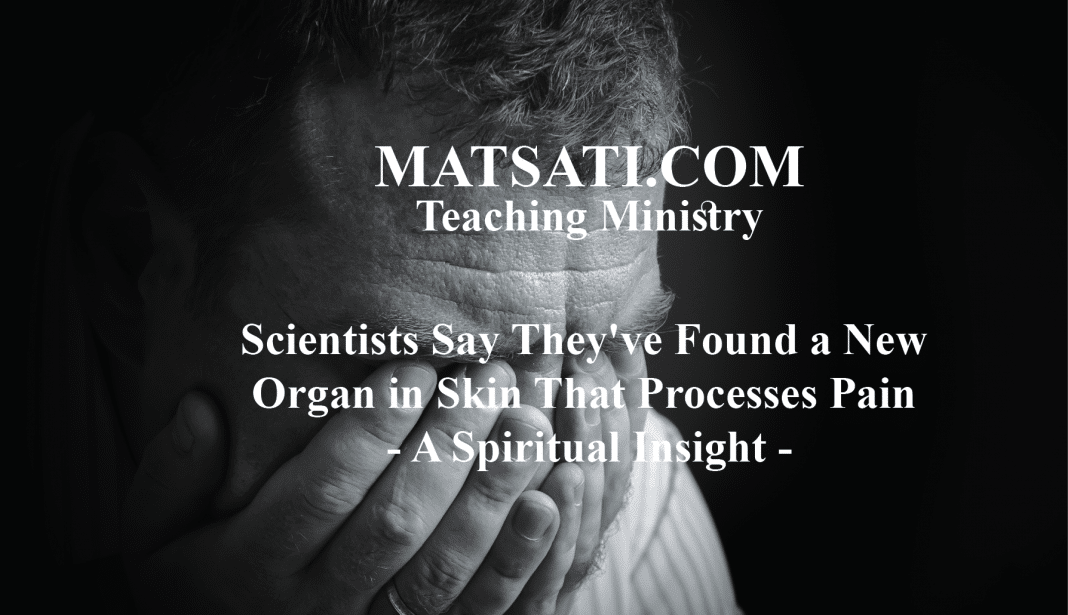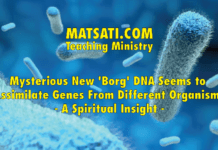A recent paper published in the Journal Science [1] details the findings of a newly discovered cell type for pain perception. A team of researchers in Sweden describe a network of cells under the skin they believe to process certain kinds of pain. This has applications for broadening our understanding of how we feel pain and how to treat it. One of the requirements for the survival of an organism is its ability to detect pain and stimuli. Originally it was thought that we receive pain sensations through certain nerve cells. The basic unit of communication in the nervous system is the nerve cell (neuron). Each nerve cell consists of the cell body, which includes the nucleus, a major branching fiber (axon) and numerous smaller branching fibers (dendrites). Dendrites are a type of structure that is best known as a phenomenon of crystal growth. (For example, dendrite structures in (crystal growth) in batteries are believed to be the reason for their igniting and burning, such as the cell phone battery fires leading to the phone recalls we have heard in the past.) The myelin sheath is a fatty material that covers, insulates and protects the nerves of the brain and spinal cord. Nerve cells are kept alive by being connected to other cells called glia. Outside of the central nervous system, one of the two major types of glia are called schwann cells. The researchers said while studying these cells near the surface of the skin, they discovered an extensive network of cells that connect to the nerve cells different than how they interact with nerve cells elsewhere. While studying mice, they discovered these networks of cells play a direct role in pain perception. The way they conducted their research was to breed mice with these cells in their feet which when exposed to light activated these cells. When they were exposed to light, they acted as if their paws were in pain. The authors argue since this is spread throughout the skin, it should be considered an organ. A lot of work remains to be completed to understand the exact function of these new type and network of cells. Genetically modified mice were used as models to study the origins of pain in people. However, researchers have not yet studied human skin to see if this does exist in humans as well. There is something called mechanical allodynia, meaning feeling pain from non-painful mechanical stimuli such as when putting on a shirt or other types of skin touching that some people experience. Doctors often associate this phenomenon with neuropathy, and this type of research may provide insights into the mechanism for this phenomenon. The next step is to find proteins that are involved in the activation of these cells that are on the surface of the cell which respond to mechanical stimulation. Future studies are also planned to study chronic pain using animal models as well.
References
- Hind Abdo1, Laura Calvo-Enrique, Jose Martinez Lopez, Jianren Song, Ming-Dong Zhang, Dmitry Usoskin, Abdeljabbar El Manira, Igor Adameyko, Jens Hjerling-Leffler, Patrik Ernfors, “Specialized cutaneous Schwann cells initiate pain sensation,” Science 2019, Vol. 365, Issue 6454, pp. 695-699, DOI: 10.1126/science.aax6452
The Spiritual insight that we receive from this type of research is related to pain and suffering. When we seek to understand why there is pain and suffering in this world, it is important to think about what questions we are asking in order to gain understanding on the “why?” this is happening. It depends upon how we interpret the reason or potential purpose for pain and suffering in our own lives. Some questions to ask are, “does the Lord God orchestrate suffering for good as a part of His plan for our lives?” or “does the Lord God only respond to our suffering and seek to heal us from both pain and suffering?” or “is pain and suffering a part of God’s master plan for our lives” or “is pain and suffering outside of God’s plan for our lives?” etc. These are all very important questions, and most often people state that based upon the Scriptures there is a divine purpose for everything. In the Zohar Volume 2 Bereshit B43-B45 the rabbis speak of the Lord God creating everything, from heaven to earth, to angels and demons. They state that it was through the Torah that God created the heavens and the earth and all life that we know it. The rabbis say that demons (evil spirits) are defective both above and below, (Bereshit B45.190) and warn of these evil spirits in this world being connected to the fire of Gehenom (Hell), and to beware of them. (Bereshit B45.191) Evil spirits are also said to be a source of evil in this world. When we study the Bible, the principle of God’s sovereign will, of his supreme power, who orchestrates history, and redemption according to His divine plan is revealed to us. Examples may be taken from phrases such as, “the lamb that was slain from the foundation of the world,” this is taken from the perspective that the God of Israel directs all things after the counsel of his own will and in accordance to His sovereign good pleasure (see Isaiah 40:13, Ephesians 1:3-12, and Romans 8:28). This understanding implies that suffering, regardless of its source, is inside God’s plan, and not something that is outside of it, by the allowance of suffering, God decrees its occurrence. From this exegetical approach are we neglecting what the Torah states concerning the source of pain and suffering? The Torah states that if one neglects to remain faithful to God, pain and suffering will effectively come under the language of exile, our enemies overcoming us, fear, and disease. Moshe implores the people in the Torah saying (see Devarim / Deuteronomy 30-34), therefore repent, seek the Lord God of Israel, and seek His forgiveness for sin! Not all pain and suffering however is always are the result of sin, this is demonstrated in the book of Job. But this exegetical approach precludes the necessity of Teshuvah (Repentance). This exegetical approach concerning why we suffer follows from the Scriptural premise that the God of Israel is infinite in power, wisdom, and love. Consider Paul’s potter and the clay scenario (see Jeremiah 18, Romans 9:20) this follows that surely the Lord God can do anything he desires, which implies that what is happening is for the best, even if we cannot understand the deep purposes behind God’s decrees (Isaiah 55:8-9). This exegetical approach also teaches that nothing is impossible for God (Luke 1:37); the Lord God never makes mistakes; and that the Lord God is not unaware, asleep, or unable to intervene in our lives. Indeed, the Scriptures declare that God’s power sustains the world at every moment, at both the quantum mechanical (subatomic) level to the macroscopic (cosmic) scales (see Hebrews 1:3, Colossians 1:16-17). In addition, since the Scriptures say the Lord God is loving, compassionate, and perfectly good, we can trust his plan and feel secure that “all is done according to God’s will” even when we are in darkness (Isaiah 50:10). This is an optimistic view on pain and suffering in this world and in our lives and does appear to be the approach of David in the Psalms (Tehillim).
In the Zohar Volume 2, Bereeshit B43-45 the rabbis suggest that all of these things are created by God and for the purpose of self perfection. The underlying principle is to continually look at our behavior, our habits, our livestyle, our actions, to determine whether they line up with God’s word. If these things do not, repent and seek the Lord God for help to change. A different approach to the problem of why we suffer (from those discussed above) might begin with the idea that suffering is within God’s plan, asking whether this is true or not? It might be that pain and suffering is outside of God’s plan, where it is a natural consequence of disobedience to God’s commands? Could pain and suffering be derived as a corollary to disobedience? Sin is an abuse of the freedom that God has given us and so the Lord is not responsible for suffering that arises as a consequence for turning away from the will of God which is found in His Torah. This kind of interpretation follows through from the fact that again and again we are commanded to love God, to love others as ourselves, to pursue justice, to walk in mercy, to do righteousness, etc. We have a duty to serve God and walk in His ways of truth, justice, and righteousness. The command of the Scriptures is to choose to do what is right and good, and to turn from wickedness and evil. The Torah speaks of circumcising our hearts saying, Devarim / Deuteronomy 30:6 “Moreover, the Lord your God will circumcise your heart and the heart of your descendants, to love the Lord your God with all your heart and with all your soul, in order that you may live.” (NASB) the Lord Himself will do this making us able to turn to God’s way. We however still have this freedom to choose, which may lead to failure to yield to God’s direction and leading back to pain and suffering.
Others also say pain and suffering comes from the fall of man into sin, where all of creation fell too, and so the second law of thermodynamics is the scientific explanation for both pain and suffering. There are a lot of analogies that may be extrapolated from the Scriptures under the attempt to understand and explain pain and suffering. Such as, God prunes back the vine branches, cuts back and reshapes them so the vine can grow and produce more fruit. (John 15:1-8) And our suffering builds endurance and strength and is used to the glory of the Son Yeshua (Romans 8:17). In addition, suffering enables us to have empathy, compassion, and humility before God, and so we may then be comforted by the Lord (see 2 Corinthians 1:3-4). The psalmists states that the Lord God “delivers our soul from death, our eyes from tears, and our feet from stumbling” (Tehillim / Psalm 116:8) and this is for the purpose of showing love towards others. Paul wrote in 1 Corinthians 1:5 saying, “For as we share abundantly in Messiah’s sufferings, so we share abundantly in consolation (παράκλησις, paráklēsis) of the Messiah, too.” (This Greek word παράκλησις paráklēsis means “a calling to one’s aid, a summons, a calling upon”) Notice how Paul connects pain and suffering (πάθος, pathos) with a divine calling to draw near for God’s comfort (παράκλησις, paráklēsis). Paul says this is a state of blessedness. This is written such that we are able to say, “Blessed be the God and Father of our Lord Yeshua the Messiah, the Father of mercies and God of all comfort (אלהֵי כָּל־נֶחָמָה), who comforts us in all our affliction, so that we may be able to comfort those who are in any affliction with the comfort with which we ourselves are comforted by God” (2 Corinthians 1:3-4).
Notice what the Psalmist states in Tehillim / Psalms 94:
Tehillim / Psalms 94:12-15
94:12 Blessed is the one you discipline, Lord, the one you teach from your law; 94:13 you grant them relief from days of trouble, till a pit is dug for the wicked. 94:14 For the Lord will not reject his people; he will never forsake his inheritance. 94:15 Judgment will again be founded on righteousness, and all the upright in heart will follow it. (NIV)
The psalmists writes that the one who is disciplined of the Lord is blessed. This is a very early interpretation on how the Lord discipline is through trials which may then lead to pain and suffering and is a Torah based perspective (See Devarim / Deuteronomy 30-34). This is how Paul understands the situation saying this is God Himself who is “The one calling to us in all our tribulations” (2 Corinthians 1:4). What Paul is saying here is the Lord God calls us to come to His side for comfort. We are called to draw near in Teshuvah (Repentance) with the calling to return to God’s Word as a way of life. This is such that we might offer His comfort and testimony to a lost world that is filled with pain and suffering.
These various ways for understanding pain and suffering leave out the teaching in Scripture that the Lord God Almighty can see the beginning from the end because He is infinite in power. (see Tehillim / Psalm 145:3 and 147:5, Isaiah 40:28, Romans 11:33) The Lord God is able to foresee future possibilities as well as actualities, meaning that He is able to see the conditions of all possible worlds. I think of this in the sense of reaction pathways in Chemical Engineering. The Lord is able to see all of the potential reaction pathways, side products, both major and minor, and the consequences of their formation. This causes us to face the problem of pain and suffering as a mystery and the unknown. On the one hand, the Lord God Almighty is sovereign, infinite, and powerful, who ordains all things perfectly, he knows the number of hairs on our heads, our thoughts (Tehillim / Psalms 139), and He is the one who feeds the birds, and clothes the flowers in the fields. He is the Father who takes care of His children, and orders all things to work together for good (Romans 8:28). His promises are secure, He is faithful, He reigns, He is eternal, He is truth, He is King and Lord, there are none who are powerful like Him (Devarim / Deuteronomy 4:39) and so He is in control of our lives and the future.
Another twist on all of these things in our questions about pain and suffering, reading the Torah we find the text riddled with imperative verbs. Imperative verbs are verbs that create an imperative sentence (i.e. a sentence that gives an order or command). The imperative language implies that we have a duty to live in truth, justice, mercy, love, and trust in God regardless of our situation. The Lord God Almighty and Yeshua the Messiah do not force us to follow him or accept their love, however the consequences for rejecting or disregarding God’s love, His moral and ethical teachings, have significant spiritual consequences. Just as the psalmist states over and over again, the righteous suffer and the wicked prosper. In the end, the reason why there is pain and suffering is the big question which may never be answered, at least until the point when we come face to face with the Lord. The point is we are to trust in the Lord God Almighty, and in Yeshua the Messiah, regardless of what may be going on in our lives trusting that He is leading us in His ways of righteousness, justice, and truth. This is the Torah based perspective, just as the people in the wilderness did not know what the next day would hold, they needed to trust in the Lord that He would provide! This leads to the need to consistently ask ourselves if we are living according to God’s Word, and if not, to perform Teshuvah (repent) and seek the Lord for His help in doing so. The point of pain and suffering appears to be related to whether we live our lives in “hope” or “rebellion?” Note however pain may or may not be the result of rebellion, and those who suffer and are in pain may be holding onto the blessed hope, even though deliverance is yet to be manifested. Rebellion is turning away from the Lord God in heaven, from His Messiah Yeshua, and from His Word. Hope is trusting in the Lord, seeking the counsel of God, going on day by day believing all things remain in God’s hands, in His goodness, and in His love. As creatures that are created after the image of God, we are called to patiently wait, seek, pray, and live, in order to experience the love of God as a witness to the world, to surrender our lives to His will, and watch as He lives and moves in our lives each day! We must continue to be faithful, and as hard as it may be in the midst of pain and suffering, continue to give glory to the one who created us! There is a great reward for those who do this in the midst of their suffering. The Lord will give strength to the one who holds to these truths and lives by them!









